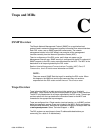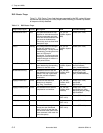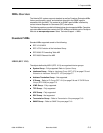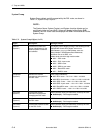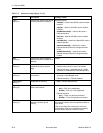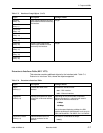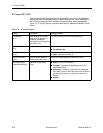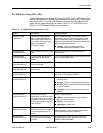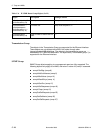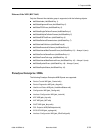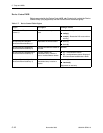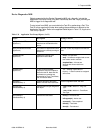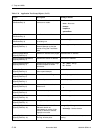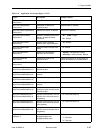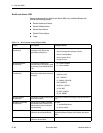
C. Traps and MIBs
6300-A2-GB20-10 November 2003
C-9
IP CIDR Route Group (RFC 2096)
This MIB obsoletes and replaces IP Group from MIB II. The IP CIDR Route Group
objects are supported for all data paths currently configured to carry IP data to or
from the device (i.e., the DSL and Ethernet interfaces). All of the objects in this
group are fully supported except as noted in Table C-6, IP CIDR Route Group
Objects. The IP Forwarding Group is not supported.
Table C-6. IP CIDR Route Group Objects (1 of 2)
Object Description Setting/Contents
ipCidrRouteTable
(ipForward 4)
Replaces the ipRouteTable in
MIB II. It adds knowledge of
autonomous system of the next
hop, multiple next hops, policy
routing, and classless
inter-domain routing.
This is a read/write table. If an interface route is
deleted but not the corresponding upstream route
(such as with DHCP relay), an SNMP Get for this
object will still show a table entry for the address and
mask assigned to the interface.
reject(2) – Value for route type and the
ipCidrRouteDownstreamValid will be false.
ipCidrRouteDest
(ipCidrRouteEntry 1)
Serves as an index to the routing
table.
This object cannot take a Multicast (Class D)
address value.
ipCidrRouteMask
(ipCidrRouteEntry 2)
This is the mask that is logical-
ANDed with the destination
address.
This is the mask before being compared to the value
in the ipCidrRouteDest field.
ipCidrRouteTos
(ipCidrRouteEntry 3)
The policy specifier is the IP Table
of the Service field.
This object will always be 0 (zero).
ipCidrRouteNextHop
(ipCidrRouteEntry 4)
The next hop route IP address for
remote routes.
If there is no router, the value is 0.0.0.0.
ipCidrRouteIfIndex
(ipCidrRouteEntry 5)
Corresponds to the IfIndex value. Identifies the local interface through which the next
hop of the route should be reached.
ipCidrRouteType
(ipCidrRouteEntry 6)
This is a read-only object.
other(1) – Not specified by this MIB (used as
interface route).
reject(2) – Entry not valid for downstream routing.
local(3) – Route to a directly connected local host
or service network.
remote(4) – Route to a nonlocal host or service
network.
ipCidrRouteProto
(ipCidrRouteEntry 7)
Corresponds to routing
mechanisms via which this route
was learned. Inclusion of values
for gateway routing protocols does
not imply that the host supports
these protocols.
This is a read-only object.
other(1) – The entry is a host route set up by
DHCP or loopback route.
local(2) – Local interface.
netmgmt(3) – Static route.
ipCidrRouteAge
(ipCidrRouteEntry 8)
Reflects the number of seconds
since this route was last updated
or otherwise determined to be
correct.
This is a read-only object.
When displayed, a value of 0 (zero) represents a
route that will be retained permanently.
ipCidrRouteInfo
(ipCidrRouteEntry 9)
This object refers to the particular
routing protocol responsible for
this route.
If this information is not present (determined by
ipCidrRouteProto value), the value is set to the
OBJECT IDENTIFIER (00).



